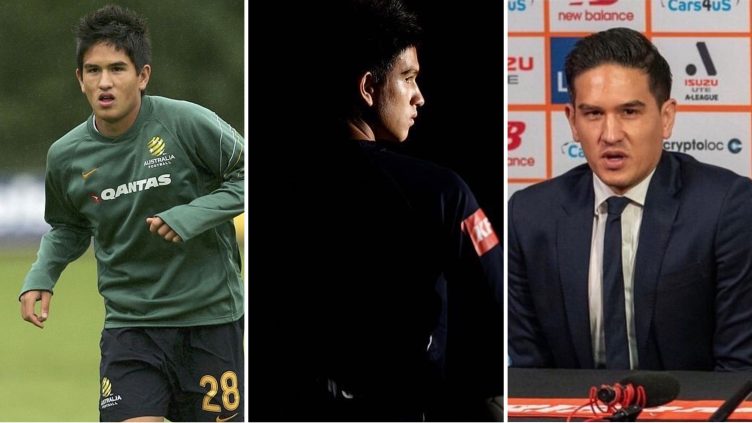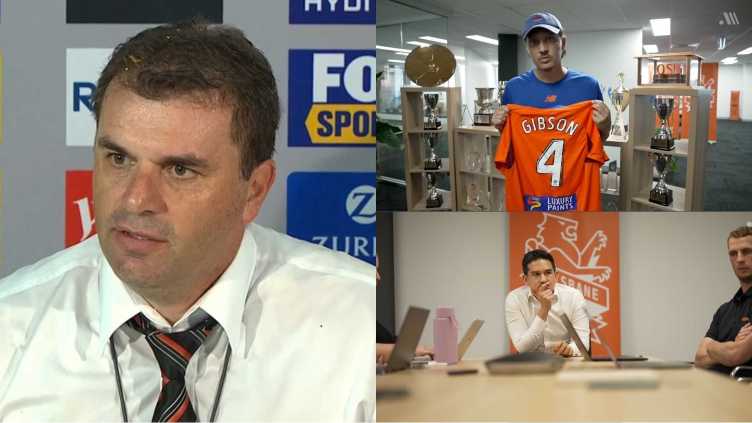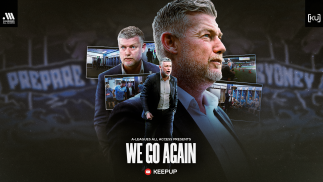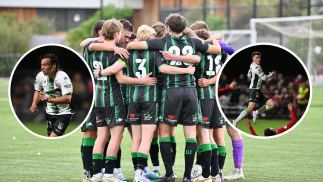Feted as next star of Australian football, Kaz Patafta turned to law as pathway to helping to rebuild an A-League champion.
Even Ange Postecoglou tried to persuade Kaz Patafta not to walk away from football, but deep inside himself Patafta knew he wasn’t actually leaving the game – it was just his pathway through it that needed to change.
12 years after one of Australian football’s most exciting prodigies quit the professional game as a player – despite Postecoglou among others trying to persuade him not to – the legal practice he pursued instead has coalesced with the love of football that never went away and created a sporting executive.
THIS WEEK’S EPISODE OF A-LEAGUES ALL ACCESS, TITLED COMING HOME, LOOKS AT KAZ PATAFTA & ZAC ANDERSON’S PROJECT TO REBUILD BRISBANE ROAR. WATCH IT TONIGHT ON ALEAGUES.COM.AU.
At 35, the one-time attacking midfielder with feet full of flair now wears a suit as the chair and CEO of Brisbane Roar, but the lessons and observations from a relatively brief but intense playing career are informing much of the work he and COO Zac Anderson are doing to rebuild the club inside and out.
UNITE ROUND TICKETS ON SALE NOW: Get your tickets for the ultimate away day here

In 2011, Patafta decided to quit playing because he could see other routes in the game that might ultimately be more rewarding, for all the ability that earned him a place training with the Socceroos ahead of the 2006 World Cup.
“There was definitely a fork in the road at the moment and the trajectory was clear – the pathway wasn’t, but I knew that this is where I wanted to end up and it was going to be a journey,” Patafta tells aleagues.com.au. “So the pieces (of his life) sort of fit together to get to where we are now, rather than being three separate careers.”
MORE AAA: ‘Not really spoken about’ part of Ange story Brisbane Roar is now being built on
A Google search of his name quickly brings up the query of “what happened to Kaz Patafta”, and the answer is far more interesting than the path of many talented young players who don’t quite make it.
Partly because of his experiences having signed for one of Europe’s most famous clubs, Patafta realised at a precociously young age that there are many ways of “making it”, and he could choose the right one for him.
“My thought process sort of 12 years ago was, I think I need to make a move outside of the game for a while,” Patafta recalls. “And (studying) the law happened to be that pathway.
“But the passion has never died, the love of the game, and the ambition to still be a part of it at a top level. But I guess on the other side of the fence, so to speak, was the ultimate goal.
“So there was never a moment in my mind that this wasn’t where I wanted to end up. It was just how to get there.”
***
More than anything the photos of Patafta from 2006, training with the Socceroos in Eindhoven and even coming on in an unofficial friendly, seem to show the face of a boy.
But that boy had months earlier joined Portuguese giants Benfica and been taken on by Jorge Mendes, the superagent of players such as Cristiano Ronaldo.
Remarkably, that boy was already processing the experiences of walking into a foreign dressing room where “teammates” might hide his kit or shun his company because he was competition; processing those experiences in a way that would inform how his life would unfold.
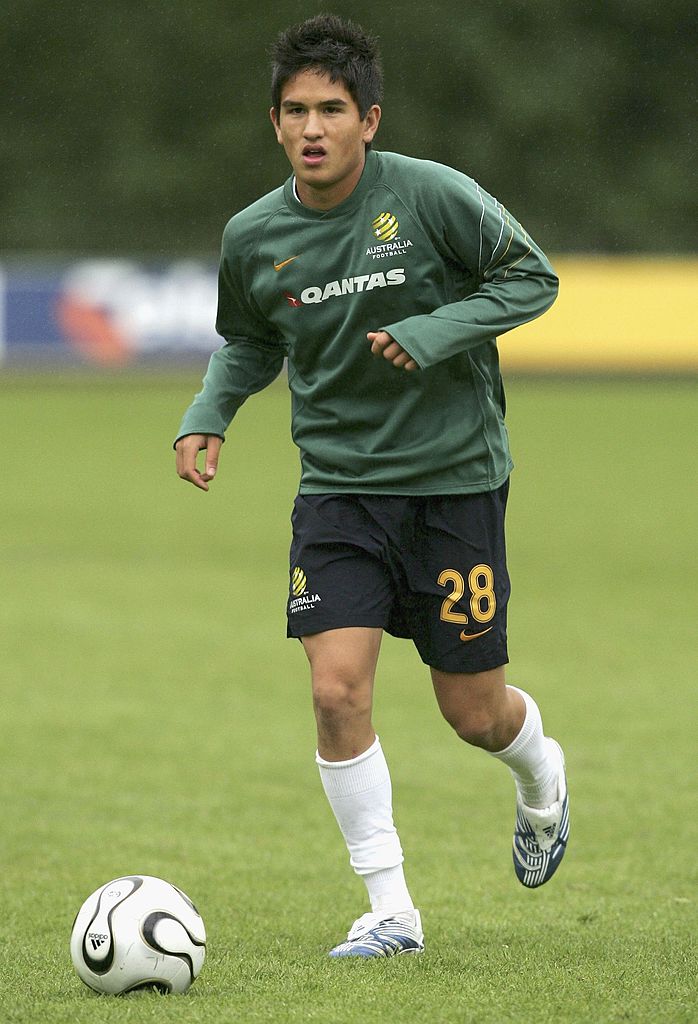
“I think that everyone faces certain adversity and challenges and football isn’t unique in that aspect,” he says. “The trajectory or the pathway that I went on was leaving home fairly young and not finishing school and having those sorts of challenges and sacrifices to pursue a professional career in football.
“That gave me insight to the world of football, not only as a player, but being managed by Mendes and seeing the other side or the commercial realities of football; how that all intertwined and tangled, there’s so many different aspects to the game that really intrigued me.
“At the time as a young kid you’re so focused on playing the game that it’s only later that you realise you’re exposed to much more. A lot of the experiences and learnings and journeys and I guess meeting such a diverse range of people allowed me to set a good foundation.
“What I take from being a player was the discipline, the ambition, the hunger to win. And also just understanding that without a good culture and without being able to lead from the top, just like a team environment, it’s hard to bring a team along with you to buy into the vision or the journey.
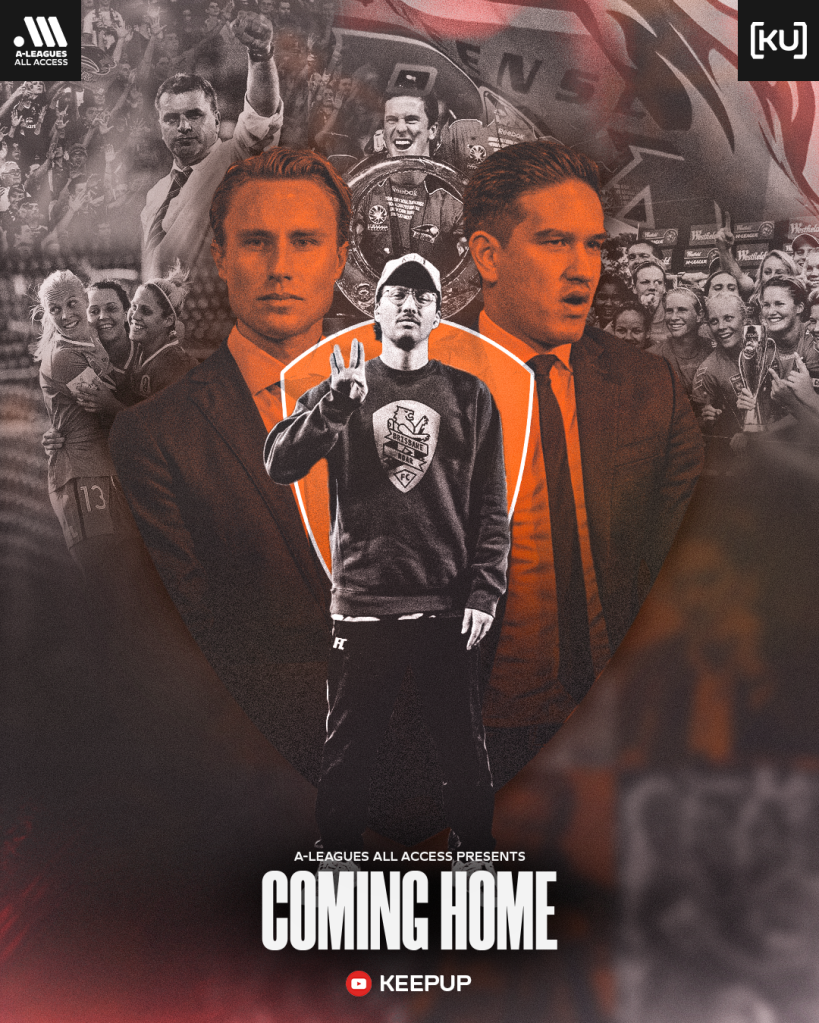
“That’s really helped guide this type of project or challenge with Brisbane Roar. I think what the club has been missing is a strategic leadership from the top, leadership that’s willing to pull the sleeves up as well and dive into the minute details of running a football club.”
All of that was swirling through the head of Patafta in his late teens at Benfica, as he weighed up the best route for his career. A deal was on offer from rivals Porto but he opted for a loan deal at Melbourne Victory instead, and then a move to Newcastle.
The one thing a player of flair and rhythm needed was consistent game time, and that was the thing he couldn’t seem to find.
“I think the best way I can describe it now and somewhat retrospectively is that I’d put so much energy as a young player into getting to Europe and that’s kind of the benchmark as a young player out of Australia, that’s where I set my targets and my goals.
“It all happened so quickly and I came back to the A-League and there was a lot of movement behind the scenes.
Brisbane Roar host a double-header at Suncorp Stadium this Sunday! Click here to buy your tickets

LETTER FROM NEW CLUB OWNER BILL FOLEY: My vision for Auckland and Northland in the A-Leagues
AUCKLAND ANNOUNCEMENT: Owner sets out Premier League ‘pathway’ in brilliant first press conference
“I think there was a moment as a player that I thought I’d somewhat missed an opportunity. I know that sounds a little strange at the time considering I was still fairly young and still had a long way to go in terms of my own development into a senior player.
“But it was that fork in the road moment where there was this desire to want to achieve more off the park. It just happened to be around that time when I still probably had an opportunity to continue to pursue a professional career, whether that was in Australia or elsewhere.
“So I can’t define the exact moment, but there was a thought process and it just seemed to me like I’d have to take a certain path if I wanted to achieve an outcome.
“That outcome was where I sit today.”
***
The next bit, in a way, is the most conventional part of the story; within weeks Patafta had enrolled in a law degree, became a legal clerk with a Sydney firm and – after a brief playing comeback went nowhere – was appointed general manager of Laotian side Lanexang United.
While the role didn’t last long it opened doors to the commercial world, and after several years of corporate advisory work he built up his own legal practice with offices in Singapore, Adelaide, Laos and Belgium.
Admitted to practice as a barrister in the ACT, it was an eminent and rewarding career path and one he had come to enjoy. But as a phone call earlier this year from his friend Anderson reminded him, it was also meant to be a path leading back to football.
For four months now he and Anderson have been running Brisbane, or rather trying to rebuild Brisbane. As a challenge it’s immense, but also precisely what he had envisaged years before.

“I think if I’m honest, (studying law) started out as a vehicle and I think I grew a passion for the law over time, and I became very immersed in it,” he says.
“I’ve seen it as a great foundation to be able to build upon into a career in administration for sport.
“There’s so many more aspects to running a football club, but it has been a great foundation and I have great respect for law and for the profession.
“I think it’s also that entrepreneurial spirit in me that sort of guided me down that path (of establishing his own practice) and wanting to push the boundaries.
“That’s probably evident in this type of type of pathway as well that you’re always trying to push that next boundary and trying to break open a bit of a mould.
“But also you can have a lot of upside and I think the club needs that type of energy. Looking back on the last 12 years, building a foundation through legal practice as well has really set me in good stead to steer this ship, so to speak.
“As a young player you’re just so focused on what’s ahead, what am I going to do in the next training session and who’s gonna be there and who’s watching me and how do I get to the next step?
“That’s the beauty of this game that you’re always looking to improve and you’re always looking for what’s next.
“I was very focused and almost obsessive about pursuing this lifelong dream and there are elements of that now that come back into being a CEO of a club, that deep-rooted desire, passion, hunger to succeed.
“Which is what we’re trying to inject into the club and to get people to feel that sort of urgency to be successful again.
“I believe strongly that the foundations can be rebuilt. That’s the culture and mentality that we want to instill into the organization.”

